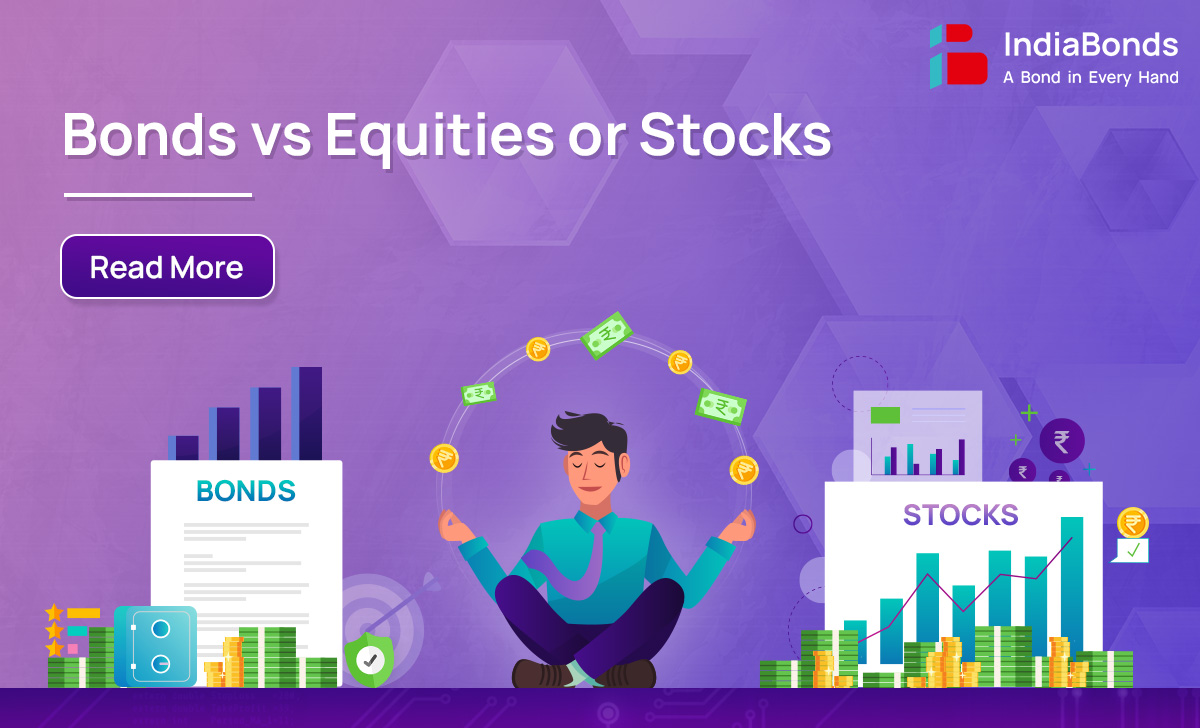Bonds vs Equities or Stocks

What is the most common question that every financial advisor receives? What is the most discussed topic in every investment forum, financial planning and investment advice literature? And what is the all-time, go-to topic for a “fin-fluencer” to create content on?
Bonds vs Equities
Bonds and stocks are the two most talked-about asset classes in the universe of financial assets. Each of them has its pros and cons and they stand shoulder to shoulder with each other. Time and again, these two instruments have caused a debate for investors, creating a selection issue for determining which is better. While one helps in wealth creation, the other focuses on preservation. Therefore, it is crucial to understand the difference between stocks and bonds. However, before addressing the comparison between bonds and equities, let’s try to understand the concepts of bonds and stocks individually.
What are Equities?
Equity, in simple terms, represents ownership. When you invest in the equity or stock of a company, you become a part-owner of the amount you have invested. As an owner, you are entitled to a share of the earnings, known as dividends, after all its obligations have been cleared. Investing in equity can be a profitable venture as it allows for the potential of high returns, particularly over the long term. However, it is important to note that investing in equity also involves a certain level of risk, as the value of a stock can fluctuate depending on various factors such as market conditions, the performance of the company and global economic trends.
Characteristics of Stocks or Equities
- Ownership and Control: Shareholders have a claim on the company’s assets and earnings.
- Risk and Return: Higher potential returns with corresponding higher risk.
- Dividends: Potential income through dividends, dependent on company profits.
- Voting Rights: Ability to vote on corporate decisions and board elections.
What are Bonds?
Bonds are simply loans. When you invest in bonds, you’re essentially lending money to the company. Unlike equity, which represents ownership in a company, bonds are a form of debt financing that allows entities to raise capital by borrowing money from investors. One unique aspect of bonds is their fixed-income nature, which means that investors receive a regular stream of interest payments at a predetermined rate. This makes bonds an attractive investment for those seeking a steady income stream or looking to diversify their investment portfolio.
Characteristics of Bonds
- Debt vs. Ownership: Bonds are considered debt investments, with bondholders classified as creditors.
- Fixed Income: Regular and predictable interest payments.
- Lower Risk: Relatively less risky, compared to stocks due to fixed interest rates and priority in bankruptcy.
- Maturity: Bonds have a defined term after which the principal amount is repaid.




Difference between Bond and Equity
| Bond | Equity | |
| Definition | A type of fixed-income investment where an investor loans money to an entity for a specified period at a fixed or variable interest rate. | Ownership stake in a company, entitling the investor to a portion of the company’s profits and losses. |
| Risk | Relatively considered less risky than equities as bondholders have priority in receiving payment and interest payments are fixed. | Equities pose much higher risk than bonds, given their susceptibility to volatile fluctuations influenced by factors like economic conditions, business performance and market sentiment. |
| Return | The returns are considered to be more predictable, stable and reliable than equities. The returns on bonds can vary from moderate to high, depending on the credit quality of the bonds. | Historically offers higher returns than bonds, but comes with more volatility and uncertainty. |
| Bankruptcy | Bondholders are given priority over other stakeholders because they are creditors who have loaned money to the company. Typically, bonds are secured by assets, which means that if the company defaults, bondholders have a legal right to those assets to recover their investment. As a result, they are first in line to receive any proceeds from the sale of those assets. | Equity holders have no legal right to the company’s assets and are therefore last in line when it comes to receiving any money from the bankruptcy proceedings. As a result, they are at a higher risk of losing their investment entirely. |
| Examples | Government bonds, corporate bonds, municipal bonds. | Stocks, equities, mutual funds, exchange-traded funds (ETFs). |
Ultimately, the key factor in financial decision-making is an individual’s own financial goals. Instead of debating the superiority of different assets, it’s more productive to approach the question of suitability: “Which asset is best suited to my needs?” And the answer is both! Achieving financial success requires a properly balanced investment portfolio between equity and debt the ratio of which is determined basis your investment goals. A balanced portfolio with stocks and bonds can offer stability and profitability through effective asset allocation. Bonds offer a sense of security, reliability and stability when considering investing in various asset classes. If these aspects are a priority for your portfolio, then choosing bonds is a wise decision. And when it comes to bonds, look no further than IndiaBonds! As you will find curated Bonds on offer across a wide credit spectrum covering your varied investment goals.
FAQs
Q. What is the difference between a stock and a bond?
A. A stock is an equity instrument, offering ownership in a company and the potential for dividends and capital gains. A bond is a debt instrument, providing fixed income over time, prioritized over stocks in bankruptcy.
Q. What is a major difference between stocks and bonds?
A. The major difference between stocks and bonds lies in their risk and return profile. Stocks offer higher potential returns but come with increased market risk, whereas bonds provide steady, fixed returns with relatively less risk.
Q. What is the main difference between a stock and a bond?
A. Stocks represent equity in a company and can yield dividends plus capital appreciation, while bonds are debt investments that provide regular fixed-income payments.
Q. What is the difference between preferred stock and bonds?
A. Preferred stocks are hybrid investments that offer fixed dividends like bonds but also carry ownership rights like common stocks, though without voting privileges typically associated with common stocks.
Disclaimer: Investments in debt securities/ municipal debt securities/ securitised debt instruments are subject to risks including delay and/ or default in payment. Read all the offer related documents carefully.
















































